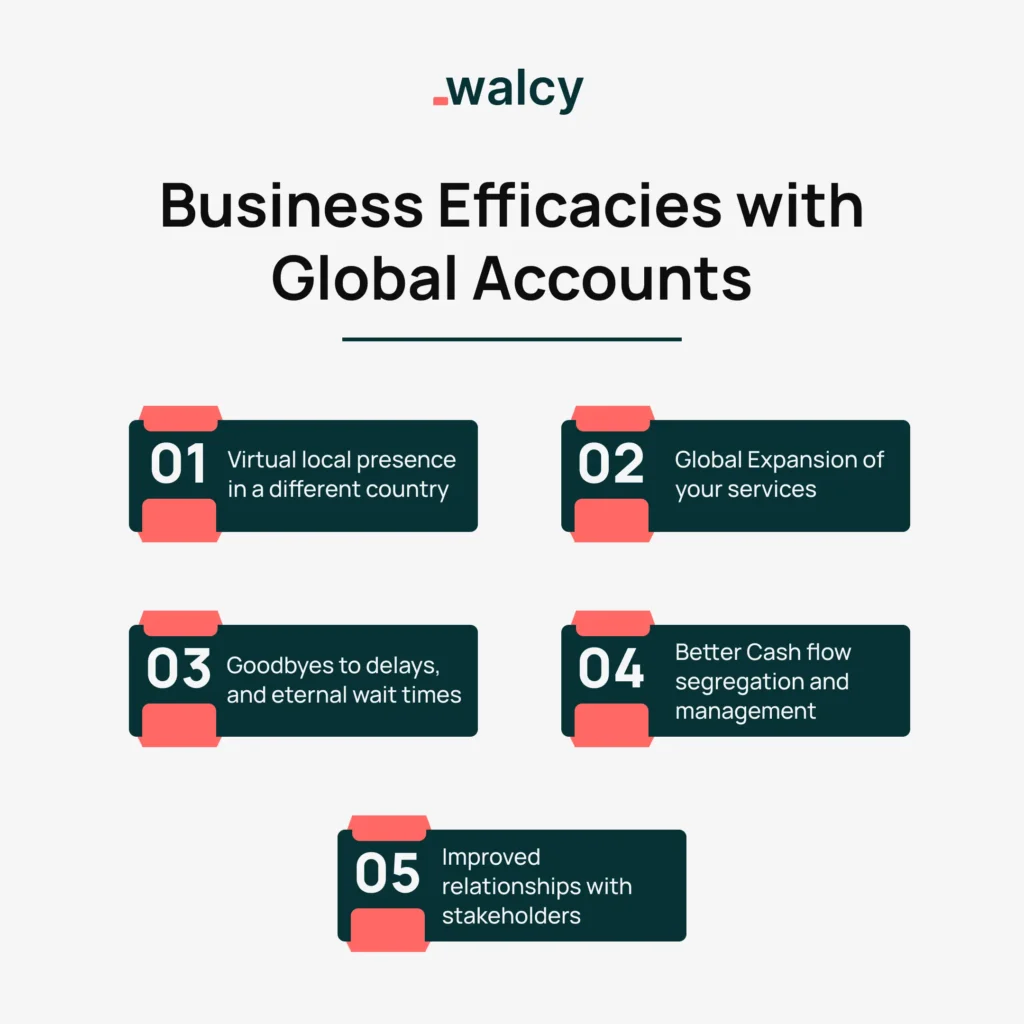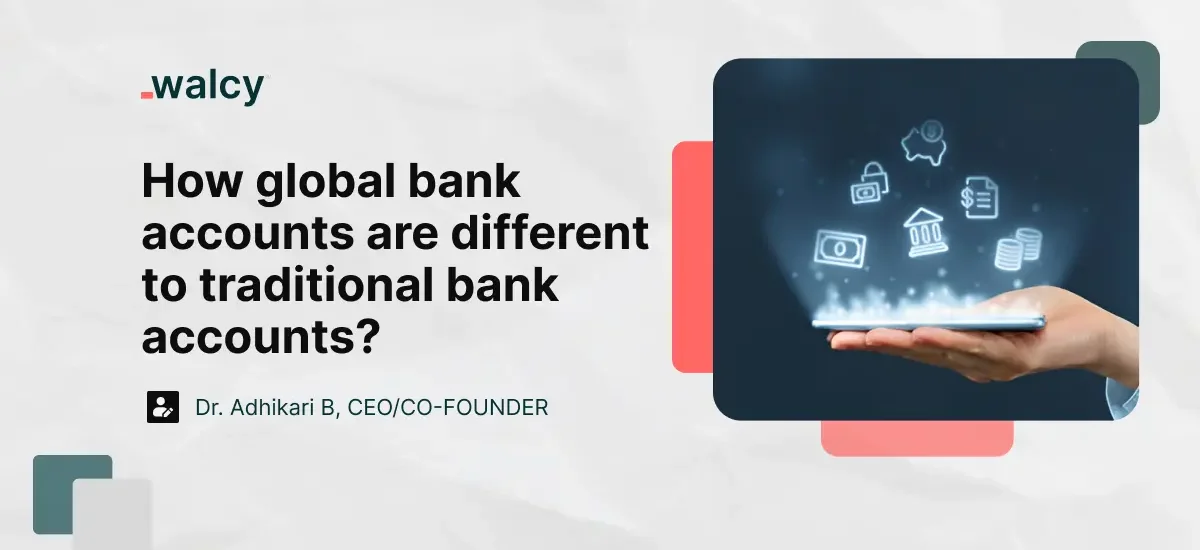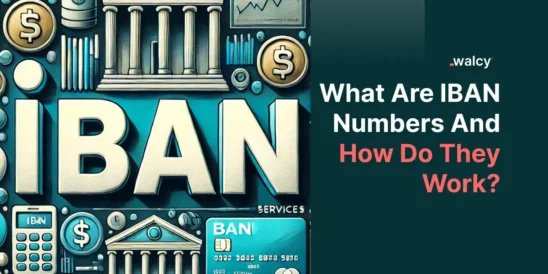
When one fathoms a bank account, he/she envisions a savings or current account in a physical bank and a bank vault that stores the funds.
However, there are many types of bank accounts other than savings or current accounts.
One such account is called a Global Account, also known as a Foreign Currency Account or Global Bank Account, and is synonymously used with a Multi-currency Account. It is a slightly different variation of an international account.
What Is A Global Account, In General?
A global bank account is a genuine bank account that holds a certain denomination, for instance, a global account in the US holds US dollars and enables you to receive payments or deposits via Inter-banking payments network like SWIFT (Society for Worldwide Interbank Financial Telecommunication), ACH (Automated Clearing House), and FEDWIRE (Federal Reserve Wire Network), LOCAL payment systems.
Global Bank Account’s primary purpose is to accept deposits and enable payout to other denominations using Foreign Exchange. A Global Account creation is one of the offerings from Neobank.
Before a deep dive into what a global account purports, let us see certain statistics about the booming neo-banking and global banking industry to ensure the adoption and confidence of the global population with the innovations of neobanks.
- The number of Neobank account users is expected to amount to 386.30m users by 2028, this trend is followed by a user penetration rate of 3.89% through 2024 and is forecasted to hit 4.82% by 2028. This is a significant leap in that within just a decade, neobanking’s global account offerings were adopted at such a quick succession.
- As per 2023’s data, India and the US had the most significant number of neobanking users with approximately 296 Million and 225 Million users, respectively. This ensures India and the US are leading the neo-banking adoption.
However, although traditional banks have started to roll out digital banking apps, why the a need for neobanks and global accounts?
The quest of this blog is to answer this very question and create a clear demarcation between a conventional bank account and a global bank account offered by a Neobank.
Moreover, It also outlines the limitations for both distinct use cases.
Global Accounts vs Traditional Accounts Critical Review
Firstly, the foremost benefit of Global Accounts is that they allow you to transact in foreign denominations, accumulate deposits, and accept international transfer payments which can be utilized in various ways.
For instance, if someone travels offshore, has clients residing in another nation, and hedge against foreign exchange rate these global accounts can be used seamlessly.
However, for day-to-day transactions within a country and local payments traditional accounts could be deemed appropriate.
However, in this case, too, neobanks are encroaching on this space by enabling all the facilities that traditional banking provided digitally without even stepping foot on the bank premises.
Secondly, global accounts provided by many neobanks support multiple-currency creation within minutes with automated or prompt KYB (Know Your Business) verification and can start receiving deposits, currency conversions, and transact funds that transcend border- all with a single dashboard or a mobile app.
On the other hand, traditional bank accounts usually do not support creating an account in a different currency other than the home country’s currency.
While some banks do provide the option to create foreign currency accounts, these often come with many limitations.
To name a few, these accounts typically cannot accept deposits directly in foreign currency; instead, they require users to manually load funds into the account.
Additionally, these accounts often have restrictions on global transactions, limiting their usability for international business or travel.
The cost of transactions in foreign currency accounts is also comparatively high, with banks imposing hefty fees for currency conversion, international transfers, and maintenance.
Furthermore, the exchange rates offered by traditional banks are usually less favorable compared to other financial services, resulting in higher overall costs for users.
Thirdly, multi-currency global accounts accept payments via multiple payment networks and do not resort to using the SWIFT network. They also can accept payment via other wire payment networks; therefore, funds collection is simplified.
Conversely, traditional banks for more than 2 decades have been dependent on SWIFT payment systems to transact funds, and initiation of the payment is manually done by the bank employees further slowing down the transaction process.
Next, the turnaround time after the initiation of the payment lifecycle for Neobank global accounts is comparatively better because they avoid the slow intermediary processes that traditional bank accounts typically encounter.
Moreover, the payment transfer ceiling is lower with traditional bank accounts. This limitation is a major hurdle for companies that operate in multiple nations to make mass payments, and each transaction in a traditional bank is checked by a banker which is a slow and manual process.
Notably, the security paradigm of modern global bank accounts adheres to state-of-the-art security frameworks like the Health Insurance Portability and Accountability Act (HIPAA), the General Data Protection Regulation (GDPR), the Payment Card Industry Data Security Standard (PCI DSS), and ISO/IEC 27001:2022.
With real-time monitoring of transactions, advanced encryption protocols like Hypertext Transfer Protocol Secure (HTTPS), Secure Sockets Layer/Transport Layer Security (SSL/TLS), and Mutual Transport Layer Security (MTLS), and a highly available, highly scalable, and fault-tolerant design.
However, most traditional banks are dependent on legacy banking systems, and a few have tediously transitioned to cloud-backed systems.
Nonetheless, legacy systems are hard to change or adapt and usually require extensive changes or revamping of the whole system, incurring massive development and deployment costs.
Also, the regulations surrounding conventional banking are slightly loose, and regulating such banks has been a hurdle for regulatory bodies.
However, since each digital transaction commenced from global accounts can be monitored, logged, and followed from initiation to completion of the transfer, they can be analyzed and smart machine-learning models can predict the validity of the payment.
This allows neobanks to quickly detect unusual or suspicious transactions and respond promptly. This technological prowess proves to be more effective than traditional banking methods used by legacy banks.
Moreover, the cost structures of global accounts are comparatively lower because neobanks offering them have a digital footprint only, with digital processes and automated verification wherever required.
This significantly reduces the operational costs of the company. These savings are usually reflected positively for customers through affordable onboarding costs, low maintenance fees, zero-fee bank account opening, no or low FX markups, and cheaper flat payout fees.
On the other hand, operating a brick-and-mortar bank is comparatively expensive, requiring a large number of bank employees, incurring depreciation, higher loan interest rates, and expensive real estate rents (as they require prime locations to operate), along with other overhead costs.
In the case of flexible operations, neobanks are comparatively more flexible with bank account openings. Teenagers, ex-pats, tourists, and businesses can easily create global bank accounts using minimal documentation requirements.
Some might question how the eligibility criteria are defined. It is done via limitations on transacting funds, requiring compulsory submission of incorporation documents, past financial histories, and credit score ratings.
Additionally, neobanks often employ advanced algorithms and automated systems to assess risk and verify identities, making the process both efficient and secure, as described before.
This approach not only streamlines account creation flexibility but also assures compliance with regulatory norms, thereby enhancing accessibility while retaining robust security measures.
Business Efficacies With Global Accounts

Virtual local presence in a different country
This is particularly useful if you are working with clients with a local foothold, and global accounts can ensure trust and credibility for those clients.
Global expansion of your services
Because you can now accept funds in desired denominations and countries, your services can easily surpass boundaries with ease.
Your offerings can be catered for developed markets or emerging markets with ease and you need not worry about hefty legacy banking fees. You can pay and receive funds from local vendors or suppliers from a different country and see your business grow globally.
Goodbyes to delays, and eternal wait times
Automated processing of funds, and innovation such as matching process- When one initiates a transfer, neobank’s matching system finds a match with someone else’s transfer going in the opposite direction, reducing the Turnaround time for business transactions.
Better cash flow segregation and management
Since digital apps provide a means to segregate funds, categorize payments, schedule payouts, check FX rates to hedge against a denomination, prepare cash flow statements, and neobanks also provide handy calculators to calculate like ROIs calculators, EBITDA statements, and credit score calculators to make informed decisions about cash flow management.
Improved relationships with stakeholders
Swift processing, a local presence appearance, lower transaction fees, verbose logging of transactions, multiple currencies within one dashboard, and enhanced security all contribute to better relationships with customers, suppliers, vendors, and stakeholders.
Conclusive Remarks
In essence, global bank accounts offered by neobanks present a paradigm shift from traditional banking, and they provide exceptional flexibility and efficiency, for instance, allowing seamless transactions transcending borders and in multiple denominations, unlike conventional accounts.
Further, global accounts empower users to conduct international business effortlessly, eliminating the hassles of slow transactions and high fees associated with traditional banks.
With advanced security measures and automated processes, neobanks ensure not only convenience but also robust protection against fraudulent activities, enhancing trust and reliability for users.
Moreover, the agility of neobanks in account creation and management, coupled with their cost-effective structures, makes them a preferred choice for individuals and businesses seeking to expand globally and optimize cash flow management.
In summary, global bank accounts redefine the banking experience, offering a new era of convenience, security, and accessibility for a rapidly evolving global economy.
Sources
⦁ Grand View Research, “Neobanking Market Size, Share & Trends Analysis Report By Account Type (Business, Savings), By Application (Enterprises, Personal), By Region (Asia Pacific, Europe), And Segment Forecasts, 2023 – 2030,” https://www.grandviewresearch.com/industry-analysis/neobanking-market
⦁ Statista, “Neobanking,” https://www.statista.com/outlook/dmo/fintech/neobanking/united-states
⦁ Unit21 Platform, “Neobank-statistics”, https://www.unit21.ai/blog/neobank-statistics
FAQs About Global Bank Accounts
What is a global account, and how does it differ from a traditional bank account?
– A global account also comprehended as a foreign currency account, global bank account, or multi-currency account, allows you to hold funds in different denominations, facilitating international transactions seamlessly.
Unlike traditional accounts, global accounts provided by neobanks offer features like multiple currency support, lower transaction fees, and efficient cross-border payments.
Why would one need a global bank?
– Global bank accounts offer several advantages, such as the ability to transact in foreign currencies, receive international payments directly, conduct business on a global scale without limitations, and be devoid of high fees often conjoined with traditional banks.
Neobanks security of global bank accounts?
– Neobanks employ state-of-the-art security measures, including encryption protocols like TLS, real-time transaction monitoring using ML algorithms, and compliance with regulatory standards such as GDPR and PCI DSS.
These security efforts help protect against fraudulent activities and ensure the safety of your funds and personal information. One can securely transact with neobanks with confidence.
Global bank account’s eligibility criteria?
– Neobanks typically have flexible eligibility criteria for opening global bank accounts. Individuals, businesses, expatriates, and even teenagers can create accounts with minimal documentation requirements.
However, certain limitations might apply, and verification processes such as KYB (Know Your Business) may be required for some users when automatic verifications are not sufficient.
What are the benefits of using a global bank account for businesses?
– Global bank accounts offer numerous benefits for businesses, including virtual local presence in different countries, easier expansion into new markets, faster transaction processing, improved cash flow management, and enhanced relationships with stakeholders.
These features empower businesses to operate internationally with greater efficiency and flexibility.
How do global bank accounts help in managing cash flow and conducting international business?
– Neobanks provides tools and features within their digital apps to help users manage cash flow effectively.
These include features for segregating funds, scheduling payouts, checking exchange rates, preparing financial statements, and calculating key metrics like ROI and EBITDA.
Additionally, global bank accounts streamline international transactions, eliminating delays and simplifying cross-border payments for businesses.
Are there any specific industries or sectors that can benefit the most from using global bank accounts?
– While global bank accounts can benefit businesses across various industries, they are particularly advantageous for companies engaged in international trade, e-commerce, freelancing, consulting, and digital nomadism.
These sectors often require seamless cross-border transactions and multi-currency support, which global bank accounts can provide efficiently.
How do the costs of using a global bank account compare to traditional banking services?
– Neobanks typically offer cost-effective structures for global bank accounts, with lower fees for account opening, maintenance, currency conversion, and international transfers compared to traditional banks.
These savings are passed on to customers through affordable pricing models, making global bank accounts a more attractive option for individuals and businesses alike.
Please refer to the Terms, Privacy Policy, and product availability applicable to your region, or visit the Walcy Pte. Ltd. website for the most current details about service availability, markups, payout costs, and related fees.
We do not make any express or implied representations, warranties, or guarantees regarding the accuracy, completeness, or timeliness of the content in this document.
This blog serves as general information and does not constitute legal, tax, or other professional advice from Walcy Pte. Ltd. It should not be relied upon as a substitute for consulting a financial advisor.
Do follow us on Facebook and LinkedIn, to stay connected with us.
By – Dr Adhikari B | CEO/Co-Founder Walcy



